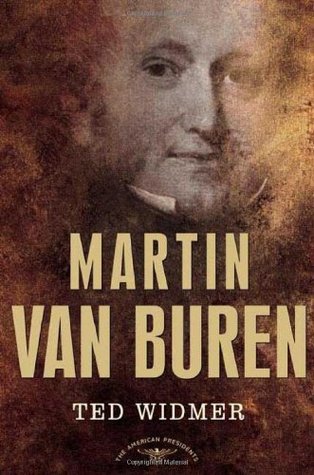“Those who have wrought great changes in the world never succeeded by gaining over the chiefs; but always by exciting the multitude. The first is the resource of intrigue and produces only secondary results, the second is the resort of genius and transforms the universe.”
Martin Van Buren
Martin Van Buren’s biography marked my first foray into The American Presidents Series. The stated aim of the series it “to present the grand panorama of our chief executives in volumes compact enough for the busy reader, lucid enough for the scholar.” Considering myself a busy (and slow) reader, these volumes would become indispensable. In the end, 28 of the 43 books I read came from this series. They varied widely in style and quality. Most were even handed and objective in their appraisals, but a few seemed disinterested in their subject and a couple completely destroyed theirs.
I will never forget that Martin Van Buren was the eighth president. That Seinfeld episode where Kramer runs into The Van Buren boys is burned into my memory. Beyond that, I had nothing. Turns out, MVB is one of the most trivia-rich presidents. Allow me to hike up the trivia section into the main body of the post.
Trivia for Martin Van Buren
- He was born in a bar (his father’s tavern in Kinderhook, NY)
- Only president to speak English as his second language
- First (and so far, last) president without any Anglo-Saxon bloodlines (parents were Dutch immigrants)
- He was the first president “born in the United States.” As in, born here after it officially became a country.
- Was the youngest president elected to date at 53
- Had a very close relationship with Aaron Burr, to the point where people speculated Burr was his father, given their similar likeness.
- He was president during the famous Amistad case.
- One of only two men to be president that neither went to college nor served the military (Grover Cleveland is the other).
There is one last bullet point where The Little Magician (just one of his many nicknames) made his most lasting impact. More than anyone, Martin Van Buren was the architect of the modern political party movement and how it is organized. What historian Henry Adams called “the systemic organization of hatreds”, The Red Fox of Kinderhook (continuing to kill it with sobriquets) helped shape the party caucus, the nominating convention, the patronage system, the publicity network and the Democratic Party itself. Van Buren’s savvy politicking would help him overcome a lack of post-secondary education and catapult him into the company of the major figures of the age, visiting Jefferson at Monticello, Madison at Montpelier and even a trip to see Federalist John Adams at Quincy. He caught the eye of some out on the frontier as well. He would become Andrew Jackson’s right hand man.
The Careful Dutchman’s father owned six slaves. Van Buren owned one himself, but he ran away early on. Matty Van’s was the first inaugural address to talk about slavery, but it was in the context that he would not seek to change it. He did not want to disenfranchise the Southern allies he had worked so hard to court over the years. Otherwise, his principles fit squarely into the “man of the people” mold. He took up for small farmers, working to ease the credit burden on producers who were cash poor and he railed against imprisonment for debt. He thought truly federal projects should be supported financially (such as national roads) but local projects should be funded locally. Any early Democrat worth his salt needed a strong states’ rights plank among his convictions. Surprisingly, he was fully opposed to the annexation of Texas. MVB saw it as unjust and asking for war with Mexico. (This was during his re-election bid in 1844, and it likely sunk his chances.)
In addition to connecting him with important politicians, The Great Manager’s party organizing helped his own efforts at the ballot box. From 1812 until 1841 when he left the White House, Martin Van Buren would hold public office every single year. Starting in the New York State Senate, he would go on to serve as a two-term US Senator, be elected Governor of New York and then almost immediately confirmed as Andrew Jackson’s Secretary of State. That appointment would be followed with a brief stint as minister to the UK before ascending to the Vice Presidency in Jackson’s second term. Having helped so many within the Party, especially Jackson, The Master Spirit was the hand-picked successor to the throne and was elected President in 1836.
Unfortunately for King Martin, it doesn’t matter how well organized your party is if the economy falls apart. People vote with their wallets. The Panic of 1837 (along with the strengthening of the opposition Whig Party) would prove his undoing. Remember those drastic monetary repercussions I mentioned in the last post? There are arguments for many root causes of the panic, including rampant speculation, overextension of credit by state banks and zero regulation. Also, the new technologies like printing and the railroad almost immediately turned poor laborers into capitalistic consumers. But most would pin it on Jackson – and, by extension, Van Buren – and his war to kill the central bank. As a New York merchant at the time wrote, “The commercial distress and financial embarrassment pervade the whole nation. Posterity may get out of it, but the sun of the present generation will never again shine out…Jackson, Van Buren and Benton form a triumvirate more fatal to the prosperity of America than Cesar, Pompey and Crassus were to the liberties of Rome.” In an interesting side note of presidential history, because of the panic Cornelius VS Roosevelt assembled great wealth in real estate buying cheap lots in Manhattan. This would boost the starting position of his grandson, Teddy.
So just how bad was Van Buren’s re-election bid in 1840? He didn’t even carry his home state of New York! Whigs won both houses and the White House as “Tippecanoe and Tyler Too!” showed the opposition had caught up in the organizing game and the two-party system was now in full effect. The Sly Fox would try again as a third party candidate with the Free Soilers in 1848, running with Charles Adams (John Quincy’s son) on an anti-slavery platform of economic opportunity and cheap land for old Jacksonians, tariffs and improvements for old Whigs and a celebration of Free Soil, Free Labor and Free Men. This wasn’t much more than a token effort as Free Soil wasn’t even allowed on the ballot in the South except Virginia and MVB only got 9 total votes there. However, it may have tilted the election away from Democrat Lewis Cass of Michigan (who had helped thwart Van Buren in 1840) over to Zachary Taylor the Whig.
Martin Van Buren is not a particularly revered or celebrated president, but he was extremely consequential in how the American political system functions to this day. It seems fitting, given The Enchanter’s many nicknames, quality trivia supply and brushes with the biggest political names of his generation, to end with an anecdote. After being voted out of the White House, MVB took a trip across the entire country to see the people he had served for so many years. In June 1842, inclement weather forced him to stop near Rochester, IL. Locals grabbed the best story teller in the area and they kept great company swapping stories with Matty Van all night with the ex-president later saying he had never “spent so agreeable a night in my life.” The storyteller? A young upstart lawyer named Abraham Lincoln. Later, during the Civil War, all US Army and Navy officers wore a black crape on their left arm in memorial to Martin Van Buren, who died in 1862.
Nicknames Used: 8 (9 if you count “MVB”)
Follow-up Reading
- America’s First Great Depression by Alasdair Roberts
- Martin Van Buren and the American Political System by Donald Cole
- The Many Panics of 1837 by Jessica M Lepler


1 thought on “The Resort of Genius”
Pingback: America Was An Only Child – Library Card Life